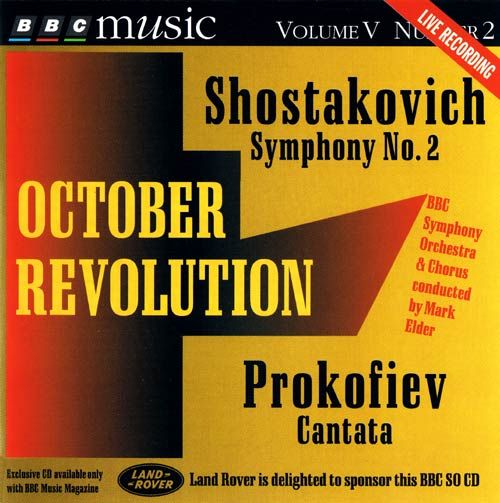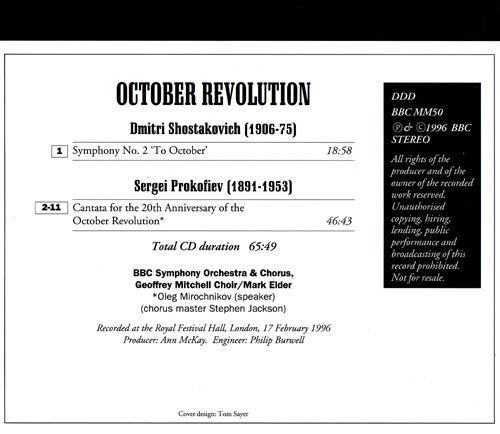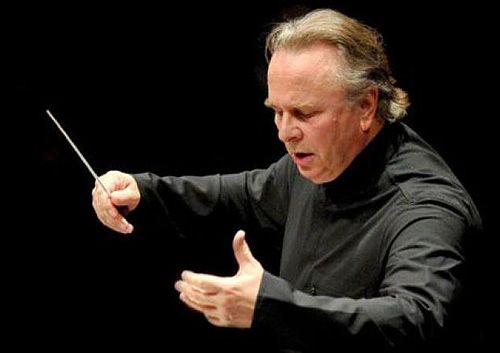wimpel69
12-02-2014, 03:18 PM
FLAC link below. This is my own rip.
Do not share. Buy the original! Please leave a "Like"
or "Thank you" if you enjoyed this!
At first glance, Sergei Prokofiev's masterful Cantata for the 20th Anniversary of the October Revolution,
for 2 choruses, accordions & orchestra, Op. 74 -- based on texts by Karl Marx and Vladimir Lenin
that extol the Bolshevik revolution -- would seem to be a hymn to the Soviet Socialist state. However,
it is in fact quite satirical. This element of satire was overlooked for many years because of the 30-
year delay in the work's premiere (an abridged premiere, at that), by which time the social
commentary was no longer current. The huge forces listed in the headnote (including two full
choirs and an enlarged orchestra) do not quite convey the size of the ensemble Prokofiev called
for. He also included a brass band, an orchestra of accordions, and a speaker, bringing the total
number of performers to about five hundred.
The work is divided into ten movements, beginning with a dissonant and grim orchestral "Prelude."
There follows "The Philosophers," whose combination of rhythm and lush melody make this one of
Prokofiev's most memorable choral creations. "A Tight Little Band," is framed by two interludes, the
last of which is raucous and augurs the coming number, "Revolution."
Here, with the sixth movement, is the heart of the work: Prokofiev begins with gentle but tense
choral music that gradually builds to an eruption of savagery, where orchestra and chorus join
in what sounds like a musical free-for-all. This section corresponds to the Battle on The Ice in
Prokofiev's music for Alexander Nevsky (1938) -- but here the music is so wanton in its crushing
power, pounding rhythms, and brassy outbursts, that it can hardly be seen as depicting heroic
revolutionaries engaged in just conflict. Rather, it portrays hooligans haphazardly seizing power.
The siren that sounds off amid the chaos near the end of the movement signals a merciful end
to the violence, but warns of dire consequences ahead.
"Victory" follows, and here Lenin, via the impassioned choral music, talks of "hunger, typhus...
devastation" and in the next sentence of celebrating victory. The next section, "The Oath," has
Stalin standing at Lenin's tomb, promising loyalty to the party's ideals and pledging all will follow
his commandment. The music here has a sacred air about it. "Symphony" follows -- a lively and
joyous orchestral piece, much in the vein of a scherzo. The concluding section, "Constitution,"
is fraught with dissonance and bombast; accompanying trumpet figures that resemble those
from "Revolution" seem to blend artificially into the thick choral and instrumental fabric.
Admirers of James Horner's film music should listen to "The Philosophers" very closely.
Composed for the tenth anniversary of the October Revolution, Shostakovich's Symphony No.2
"To October"(1927) is something of an historical and musical artifact. Historically, it recalls a time
when people still believed in the Soviet system as the great hope for Russia and, indeed, for
mankind; musically, it belongs to the period of experimentation following World War I, when
old rules of form and harmony were being tossed to the winds. In the Symphony, in essence,
Shostakovich simply tried out all sorts of musical ideas that interested him, hoping that the
result would all be of a piece. The work's very designation as a symphony -- it was originally
titled "To October: A Symphonic Dedication" -- appears to have been an afterthought, as
though the 21-year-old composer wanted to relieve the pressure of having to follow up his
spectacularly successful teenage achievement, the Symphony No. 1 (1923-1925).
The Symphony No. 2, cast in a single 20-minute movement, opens in a dark, ominous
miasma of atonality that leads into a violent martial section. A bizarre passage for solo
violin, clarinet, and bassoon introduces the work's most notorious segment, a fugue-like
section with no fewer than 13 subjects. Things quiet down a bit before a blast of a factory
whistle -- not simulated, but the actual "instrument" -- ushers in a chorus that literally sings
the praises of the Revolution, culminating at the end in a shout of "October and Lenin! The
new age and Lenin! The commune and Lenin!" Though embarrassingly jingoistic at times,
and though a decidedly lesser accomplishment than Shostakovich's later symphonies, the
work contains moments of genuine excitement and drama and provides an intriguing
perspective on the evolution of one of the most-discussed composers of the twentieth
century. Once Stalin's reign of terror began in 1937 -- the year this work was completed -
Prokofiev withdrew it and abandoned ideas of a performance during his lifetime. He
certainly feared the dire consequences that befell so many other Soviet artists of the
period, like theater director Vsevolod Meyerhold, arrested in 1939 and executed in 1940.

Music Composed by
Sergei Prokofiev
Dmitri Shostakovich
Played by the
BBC Symphony Orchestra
With the
BBC Symphony Chorus
Geoffrey Mitchell Choir
Conducted by
Sir Mark Elder


Download Link - https://mega.co.nz/#!6QB2ibJb!cBG1xp39FvuzqNb3K5_QMN72XJ3_iLLjm_DOZHz mbN0
Source: BBC Music Magazine CD, 1996 (my rip!)
Format: FLAC(RAR), DDD Stereo, Level: -5
File Size: 277 MB
Enjoy! Don't share! Buy the origina! Please leave a "Like" or "Thank you" if you enjoyed this! :)
Do not share. Buy the original! Please leave a "Like"
or "Thank you" if you enjoyed this!
At first glance, Sergei Prokofiev's masterful Cantata for the 20th Anniversary of the October Revolution,
for 2 choruses, accordions & orchestra, Op. 74 -- based on texts by Karl Marx and Vladimir Lenin
that extol the Bolshevik revolution -- would seem to be a hymn to the Soviet Socialist state. However,
it is in fact quite satirical. This element of satire was overlooked for many years because of the 30-
year delay in the work's premiere (an abridged premiere, at that), by which time the social
commentary was no longer current. The huge forces listed in the headnote (including two full
choirs and an enlarged orchestra) do not quite convey the size of the ensemble Prokofiev called
for. He also included a brass band, an orchestra of accordions, and a speaker, bringing the total
number of performers to about five hundred.
The work is divided into ten movements, beginning with a dissonant and grim orchestral "Prelude."
There follows "The Philosophers," whose combination of rhythm and lush melody make this one of
Prokofiev's most memorable choral creations. "A Tight Little Band," is framed by two interludes, the
last of which is raucous and augurs the coming number, "Revolution."
Here, with the sixth movement, is the heart of the work: Prokofiev begins with gentle but tense
choral music that gradually builds to an eruption of savagery, where orchestra and chorus join
in what sounds like a musical free-for-all. This section corresponds to the Battle on The Ice in
Prokofiev's music for Alexander Nevsky (1938) -- but here the music is so wanton in its crushing
power, pounding rhythms, and brassy outbursts, that it can hardly be seen as depicting heroic
revolutionaries engaged in just conflict. Rather, it portrays hooligans haphazardly seizing power.
The siren that sounds off amid the chaos near the end of the movement signals a merciful end
to the violence, but warns of dire consequences ahead.
"Victory" follows, and here Lenin, via the impassioned choral music, talks of "hunger, typhus...
devastation" and in the next sentence of celebrating victory. The next section, "The Oath," has
Stalin standing at Lenin's tomb, promising loyalty to the party's ideals and pledging all will follow
his commandment. The music here has a sacred air about it. "Symphony" follows -- a lively and
joyous orchestral piece, much in the vein of a scherzo. The concluding section, "Constitution,"
is fraught with dissonance and bombast; accompanying trumpet figures that resemble those
from "Revolution" seem to blend artificially into the thick choral and instrumental fabric.
Admirers of James Horner's film music should listen to "The Philosophers" very closely.
Composed for the tenth anniversary of the October Revolution, Shostakovich's Symphony No.2
"To October"(1927) is something of an historical and musical artifact. Historically, it recalls a time
when people still believed in the Soviet system as the great hope for Russia and, indeed, for
mankind; musically, it belongs to the period of experimentation following World War I, when
old rules of form and harmony were being tossed to the winds. In the Symphony, in essence,
Shostakovich simply tried out all sorts of musical ideas that interested him, hoping that the
result would all be of a piece. The work's very designation as a symphony -- it was originally
titled "To October: A Symphonic Dedication" -- appears to have been an afterthought, as
though the 21-year-old composer wanted to relieve the pressure of having to follow up his
spectacularly successful teenage achievement, the Symphony No. 1 (1923-1925).
The Symphony No. 2, cast in a single 20-minute movement, opens in a dark, ominous
miasma of atonality that leads into a violent martial section. A bizarre passage for solo
violin, clarinet, and bassoon introduces the work's most notorious segment, a fugue-like
section with no fewer than 13 subjects. Things quiet down a bit before a blast of a factory
whistle -- not simulated, but the actual "instrument" -- ushers in a chorus that literally sings
the praises of the Revolution, culminating at the end in a shout of "October and Lenin! The
new age and Lenin! The commune and Lenin!" Though embarrassingly jingoistic at times,
and though a decidedly lesser accomplishment than Shostakovich's later symphonies, the
work contains moments of genuine excitement and drama and provides an intriguing
perspective on the evolution of one of the most-discussed composers of the twentieth
century. Once Stalin's reign of terror began in 1937 -- the year this work was completed -
Prokofiev withdrew it and abandoned ideas of a performance during his lifetime. He
certainly feared the dire consequences that befell so many other Soviet artists of the
period, like theater director Vsevolod Meyerhold, arrested in 1939 and executed in 1940.

Music Composed by
Sergei Prokofiev
Dmitri Shostakovich
Played by the
BBC Symphony Orchestra
With the
BBC Symphony Chorus
Geoffrey Mitchell Choir
Conducted by
Sir Mark Elder


Download Link - https://mega.co.nz/#!6QB2ibJb!cBG1xp39FvuzqNb3K5_QMN72XJ3_iLLjm_DOZHz mbN0
Source: BBC Music Magazine CD, 1996 (my rip!)
Format: FLAC(RAR), DDD Stereo, Level: -5
File Size: 277 MB
Enjoy! Don't share! Buy the origina! Please leave a "Like" or "Thank you" if you enjoyed this! :)